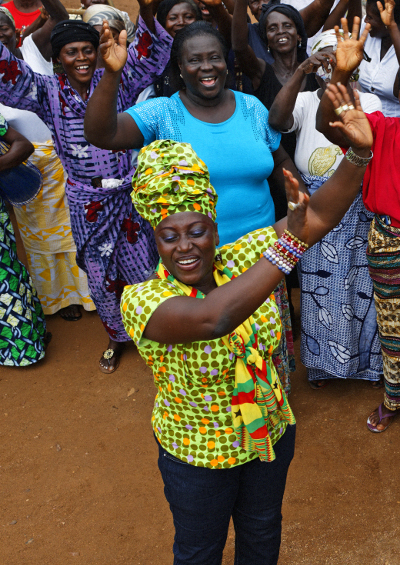Women’s Rights in Ghana: Protecting Widows
Akumaa Mama Zimbi helps widows in Ghana preserve their land and their rights.
January 3, 2015

Reza Deghati is an award winning photographer with over thirty years of experience with photography. In addition to photography, Reza has published 27 books, founded an NGO called Aina that focuses on global media training and works to give media training to women and children.
Akumaa Mama Zimbi is a Ghanaian cultural icon. She has starred in five feature films, hosts television and radio talk shows, and writes a regular newspaper column. But she is also one of the country’s best-known campaigners for women’s rights.
Widows are a big focus of her work. In Ghana, many women who lose their husbands are pushed to the margins of society. Some find themselves accused of witchcraft and exiled from their communities. Others, if they don’t have any sons, are stripped of their land.
Through her Mama Zimbi Foundation, Akumaa launched the Widows Alliance Network (WANE) in 2007. Aimed at strengthening widows’ economic standing, WANE has already organized more than 300 programs covering everything from career training and agriculture to reproductive health, sewing and beekeeping.
Akumaa also runs a media production house dedicated to promoting women’s rights through the media and education.
Text and photographs by Reza Deghati
Akumaa meets members of the Widows Association of Akwamufie, a Ghanaian city that is also home to a palm oil project set up by her Widows Alliance Network. Due to WANE, these widows today play an important role in the environmental progression and reproductive health of the ten respective Ghanaian towns and communities.
A widow from the Hikpo region in Ghana and member of WANE (Widows Alliance Network) is participating in the fourth National Widows Alliance Conference in Ghana’s capital, Accra.
Emelia Asieduwaa, a widow from the Hikpo region of Ghana.
Janet Amoakowah, another widow from the Hikpo region of Ghana.
A widow and her daughter.
 Reza Deghati is an award winning photographer with over thirty years of experience with photography. In addition to photography, Reza has published 27 books, founded an NGO called Aina that focuses on global media training and works to give media training to women and children.
Reza Deghati is an award winning photographer with over thirty years of experience with photography. In addition to photography, Reza has published 27 books, founded an NGO called Aina that focuses on global media training and works to give media training to women and children.The Other Hundred is a unique photo-book project (order here) aimed as a counterpoint to the Forbes 100 and other media rich lists by telling the stories of people around the world who are not rich but who deserve to be celebrated.
Its 100 photo-stories move beyond the stereotypes and cliches that fill so much of the world’s media to explore the lives of people whose aspirations and achievements are at least as noteworthy as any member of the world’s richest 1,000.
 Selected from 11,000 images shot in 158 countries and submitted by nearly 1,500 photographers, The Other Hundred celebrates those who will never find themselves on the world’s rich lists or celebrity websites.
Selected from 11,000 images shot in 158 countries and submitted by nearly 1,500 photographers, The Other Hundred celebrates those who will never find themselves on the world’s rich lists or celebrity websites.Takeaways
Author
The Globalist
Read previous

Global Politics
Italy’s Political Vacuum
January 2, 2015




